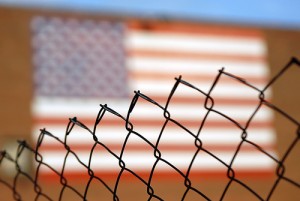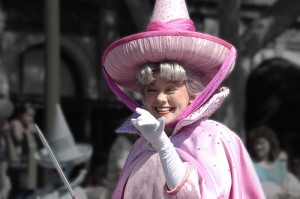This just a hunch, but I think the American Dream has shifted from myth to fairy tale. While a myth is “sacred” story expressing a deeply-held collective belief, a fairy tale tends to be a magic-infused morality tale. (I know these definitions are contestable, but bear with me.)

Plenty of intellectuals have voiced concerns over the myth of the American Dream and its dangerous implications–if everyone in America can succeed through individual hard work, then those who do not succeed have only themselves to blame.This theme seems to be popping up more and more as we face certain contemporary American nightmares–international discord, economic disaster, increasing numbers of citizens without access to the basic necessities of employment, health services, adequate education, etc. So for many, the American dream has been revealed as the myth that it is. Of course, it’s easy to attribute this sense to my own position in cynical academia — so I offer these “popular” confirmations: One of my first-year students is writing about the problematic messages in The Pursuit of Happyness; a recent column by Entertainment Weekly’s Mark Harris (“All Rags, No Riches”) comments critically on the Academy’s preference for the fantastic optimism of Slumdog Millionaire over the devastating realism of Wendy and Lucy. As Harris, the “American” dream may not be so nation-specific:
At a time of worldwide recession, Slumdog‘s sentimental notion that poverty can be overcome with plucky determination feels designed to camoflauge unpleasant facts rather than illuminate them… The idea that even if you fall in a pile of crap, you can come up smelling like a million bucks (this is not a figure of speech but an actual plot description) never seems to go out of style. And while it’s hard to resist this movie’s ardent love-conquers-all romanticism, it’s also hard to look at those Mumbai slums and then swallow the promise that getting rich is just about stick-to-itiveness. Even in a fantasy.
(By the way, EW regularly provides some of the most astute rhetorical analyses of pop culture. I highly recommend it.)
On the other hand, the New York Times recently featured a less-than-critical look at “Riveting Tales for Dark Days”
Consumers who are motivated by the laurels heaped on these films to plunk down increasingly scarce disposable income will leave the movie house with the message that circumstance is just that, and no match for the indomitability of human will. The films are built on individual successes — kids from the slums who better themselves, a television celebrity who finds his inner newsman, a newborn who overcomes old age and the midlife closeted man who steps into the light — that accrue to the greater good. That message, that darkness can be overcome by individuals working for the common good, is not so distant from the current collective impulse.
I think it’s too easy to assume that these tales of individual triumph in the face of overwhleming odds can be read as evidence of or support for a “collective impulse.” But I do think they might indicate a shift in the “American Dream” in that success seems to depend upon not just on the “pull yourself up by your bootstraps” but also upon a “deus ex machina” that assists the worthy individual. For example, the slumdog can become a millionaire (and love conquers all) through the opportunities of an Indian “Who Wants to Be a Millionaire.”
This observation aligns in interesting ways with my ambivalence in the face of “reality shows” devoted to helping deserving underdogs. The big one, of course, is “Extreme Makeover: Home Edition,” in which the manic Ty Pennington and his enormous crew make over the homes and lives of individuals and families who cannot do so on their own.
This show bugs me for a few reasons. Mostly I can’t stand the self-congratulatory shouting and tear-jerking–but I’m also vaguely uncomfortable with the possible effects of this show on its fans. By “rescuing” individual cases without consideration of the institutional and socioeconomic factors that have contributed to the family’s difficulties in the first place, the show tends to avoid larger causes for concern. Moreover, the act of watching these uplifting makeovers tends, I think, to mitigate the audience’s own feelings of civic responsibility, to allow them to feel like “someone” is handling the problem… so they don’t have to.
But I’ve started to think it might be even more insidious than that–that this show (and plenty others like it) revises the American Dream to a fantasy of rescue from without. Larger ideological and institutional forces remain unexamined, individuals can still be “blamed” for “failure,” but now they can also be “saved” by a corporate fairy godmother. 
A dream or a fairy tale… Which is more dangerous, I wonder?

Well, it’s hard to maintain the hard-work-leads-to-success myth in the face of double digit unemployment, rampant foreclosures, bankrupt companies and Madoff scale ponzi schemes. So, you’re suggesting that the myth got it’s own “makeover” by way of the fairy tale, to make a “bit of luck or magic-leads-to-success” story (Lord of the Rings, Harry Potter, Who wants to be a millionaire, etc). It helps if a) the protagonist’s parents are dead. b) He (it’s almost always he) isn’t really pursuing the success that he achieves (Jamal didn’t want the money, just to be reunited with Latika; Harry didn’t want his fame, just to understand his history and fate); c)He demonstrates his worthiness through symbolic acts of courage and integrity that don’t materially assist the attainment of his goals (which remains in the hands of the gods) d) they are youthful, attractive, and male and e) possess or receive some scar or sign of their selection.